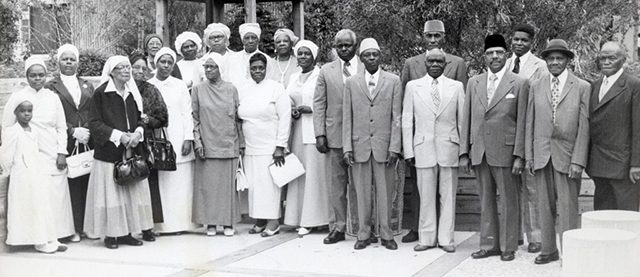
Oral History Interview with Rafiq Mahdi on August 26, 2020
Files
Loading...
Interviewee
Mahdi, Rafiq
Interviewer(s)
Cook, Ayesha; Perkins, Dr. Alisa (Research Director)
Description
Oral history interview with Rafiq Mahdi conducted by Ayesha Cook on August 26, 2020. Interview written by Dr. Alisa Perkins (Research Director) and Ayesha Cook. Rafiq Mahdi was born in 1951 in Ann Arbor, Michigan to parents who hailed from Oklahoma and Mississippi. Mahdi was raised as a Methodist and attended Sunday school as a child. After graduating from Ann Arbor High School, Mahdi attended Washtenaw Community College in Michigan. He later moved to Georgia, where he pursued studies at the DeVry School of Technology in Atlanta (formerly Bell & Howell). While in Atlanta, Mahdi met his wife, Nafeesa Mahdi, who was then a student at Morris Brown College. Mahdi returned to Michigan with his wife after the couple completed their studies in Atlanta. The couple settled in Inkster, and later moved to Detroit. In Michigan, Mahdi reverted to Islam after being influenced by the teachings of Imam Warith Deen Mohammed. As an active member of the local Muslim community, Mahdi joined with a small group of others to establish Masjid Jase Bell Joshua in Inkster. Mahdi and his wife were also active members of Historic Masjid Wali Muhammad in Detroit and enrolled their children at Al-Ikhlas Training Academy, an Islamic parochial school. Mahdi and his family created Nine United, a group dedicated to community development and recognition of prominent members of the community. In the interview, Mahdi details the different ways that he and his family have been involved in local Muslim institutions and the benefits of commmunity cohesion. He also discusses his wish for Detroit’s African American Muslim community to advance their financial autonomy by establishing and supporting more community-owned businesses.
Date of Interview
8-26-2020
Location of Interview
Detroit, MI (Muslim Center Mosque and Community Center)
Keywords
Imam Luqman Abdullah, African-American history, African-American Muslims, Imam Nadir Ahmad, Al-Ikhlas Training Academy (ATA), Ann Arbor, Ann Arbor High School, Ann Arbor Public Schools, Atlanta, Baptist church, Bell & Howell School of Technology, Black Muslims, Black Wall Street, Black-owned businesses, Child-rearing, Committee for the Removal of All Images that Attempt to Portray the Divine (C.R.A.I.D.), Community activism, Community development, Community recognition award, Community service, Covert racism, Cultural diversity, Detroit, DeVry School of Technology, Diversity, Economic independence, Entrepreneurship, Extracurricular activities, Familial bonds, Family business, Family gathering, Family structure, Family-owned business, Ford River Rouge Plant, Henry Ford, Friday prayer, Fundraising, Golden rule, Grandchildren, The Great Migration, Halal food, Halal meat market, Historic Masjid Wali Muhammad, Home ownership, Inkster, Inkster mosque, Integrated schools, Intergenerational relationships, Islam, Islam in America, Islamic parochial school, Eddie Kendricks, Kinship, Marriage, Masjid Al-Haqq, Masjid Jase Bell Joshua, Methodist Christianity, Michigan, Michigan Avenue, Mississippi, Imam Warith Deen Mohammed, Morris Brown College, ‘Muhammad Speaks', The Honorable Elijah Muhammad, Muskogee, Muslim Americans, Muslims, Name signification, Nation of Islam, Neighborhood cleanup, Neighborhood revitalization, Newspaper sales, Nine United, Northern United States, Oklahoma, Okolona, Overt racism, Public school, Racism, Recognition, Row Houses, Russell Woods, Safari skating rink, Self-esteem, Sister Clara Muhammad Schools, Southeast Michigan, Southern United States, Sovereignty, Sunday dinner mosque fundraisers, Sunday school, University of Michigan, Washtenaw Community College
Disciplines
African American Studies | Africana Studies | American Studies | Civic and Community Engagement | Community-Based Research | Digital Humanities | Ethics in Religion | Inequality and Stratification | Islamic Studies | Nonprofit Administration and Management | Politics and Social Change | Race and Ethnicity | Race, Ethnicity and Post-Colonial Studies | Religion | Urban Studies and Planning
Language
ENG
Document Type
Interview
Rights Statement
Dream of Detroit Interviews were made possible by funding from the Pillars Grant and Whiting Foundation. Content is for educational purposes only and non-reproducible; interviews are not to be duplicated, but may be linked through ScholarWorks with appropriate attribution. Please direct any questions about copyright to scholarworks@wmich.edu.
Funder
Pillars Fund and Whiting Foundation
Grant
Dream of Detroit
Length of Video
01:09:30
Recommended Citation
Dream Storytelling Project Team, "Oral History Interview with Rafiq Mahdi on August 26, 2020" (2020). Dream Storytelling Interviews. 29.
https://scholarworks.wmich.edu/dream-storytelling-interviews/29




Notes
Interview conducted by Ayesha Cook at the Muslim Center Mosque and Community Center. Interview written by Dr. Alisa Perkins (Research Director) and Ayesha Cook. Interview recorded under the direction of Razi Jafri. Videography by Samayyah Cook, facilitated by Ismaeel Dhul-Quranayn. Video Edited by: Jayden Sibley. Transcribed by: Inez Mendez. Transcription edited by: Dr. Alisa Perkins. Metadata prepared by: Tristan Draper. Metadata edited by: Dr. Alisa Perkins and Sophia Wimberley.